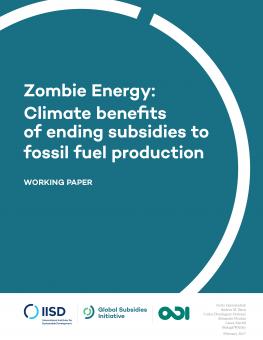
Zombie Energy: Climate benefits of ending subsidies to fossil fuel production
This working paper explains how different production subsidies currently unlock “zombie energy” from fossil fuel deposits that would not be commercially viable to produce without government support. It also presents new modelling of the global removal of certain subsidies to fossil fuel production.
This working paper explains how different production subsidies currently unlock “zombie energy” from fossil fuel deposits that would not be commercially viable to produce without government support.
It also presents new modelling of the global removal of certain subsidies to fossil fuel production. In doing so, the report builds on the dataset from the previous Overseas Development Institute (ODI) and Oil Change International (OCI) report “Empty Promises: G20 Subsidies to Oil, Gas and Coal Production” (Bast, Doukas, Pickard, van der Burg, L., & Whitley, 2015) as well as research by the Global Subsidies Initiative (GSI) on both the scale and impacts of various fossil fuel subsidies.
The report is structured as follows:
- Chapter 1 explains why fossil fuel production subsidies matter for climate change. The chapter also defines and categorizes fossil fuel production subsidies.
- Chapter 2 outlines how different subsidies influence investment decisions related to fossil fuel production.
- Chapter 3 discusses modelling of a removal of fossil fuel production subsidies and inputs of the GSI-IF (p) global model.
- Chapter 4 presents results of new modelling that shows how much coal, oil and gas could become uneconomical to produce—and the GHG emission reductions that would result—if certain fossil fuel production subsidies are removed globally.
The report concludes with a summary of the findings as well as opportunities for further research on the climate benefits of fossil fuel subsidy removal.
You might also be interested in
The Cost of Fossil Fuel Reliance
Government support for fossil fuels reached at least USD 1.5 trillion in 2023, new data shows.
Increased Support Needed to Achieve India's Clean Energy Goals
India is on track to achieve many of its 2030 clean energy goals but needs to step up government support measures to accelerate the deployment of offshore wind, electric vehicles, and green hydrogen, according to a new report.
Ending Export Credits for Oil and Gas: How OECD countries can end 2024 with a climate win
For a year now, Organisation of Petroleum Exporting Countries (OECD) governments have been negotiating an agreement that could put an end to oil and gas export finance. Following the acrimony in Baku, this would be a very real way for the OECD to show policy coherence, respond to calls from the poorest countries to stop subsidizing fossil fuels, and shift public finance to solutions.
Fossil Fuel Production, Renewable Energy, and Subsidy Reform in Nationally Determined Contributions 3.0
This policy brief provides an analysis of the critical benchmarks and recommendations necessary for aligning nationally determined contributions (NDCs) with the 1.5 °C target.